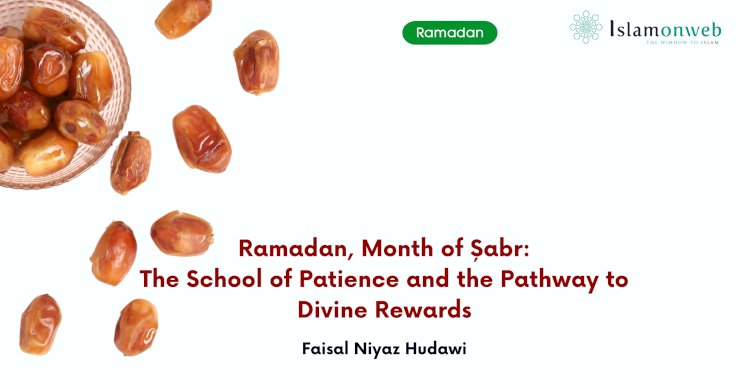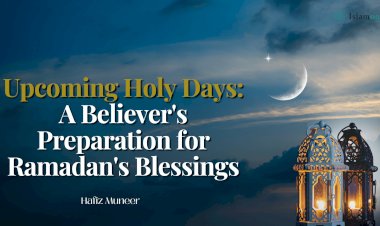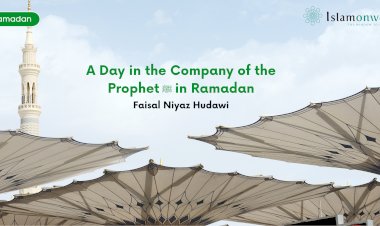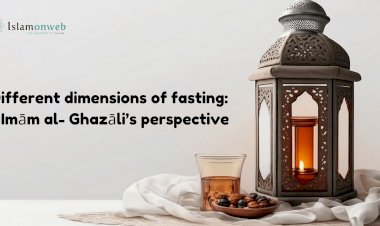Ramadan, Month of Șabr: The School of Patience and the Pathway to Divine Rewards
Ramadan, Sabr, Patience, endurance, and steadfastness
Ramadan serves as a great school, offering worshippers invaluable lessons and enriching teachings that foster and fortify their spirits, not solely confined to this month but echoing throughout their lives. Among the invaluable gains attained by those observing fasting during this sacred period is the cultivation of patience, endurance, persistence and steadfastness, encapsulated by the term "Șabr" in the spiritual lexicon of Islam.
The Noble Prophet Muhammad, peace be upon him, described Ramadan as the month of “sabr” - perseverance in several hadiths. Among them is the narration by Imam Ahmad and Muslim from the hadith of Abu Qatada, may Allah be pleased with him, that the Prophet, peace be upon him, said: "Fasting the month of Șabr (perseverance) and three days of every month is fasting for a lifetime." Additionally, Imam Ahmad narrated from Yazid ibn Abdullah ibn al-Sheikh al-Arabbi that the Prophet, peace be upon him, said: "Fasting the month of Șabr and three days of every month removes the heat of the heart." An-Nasa'i also narrated from Al-Bahili, may Allah be pleased with him, who said: The Messenger of Allah, peace be upon him, said: "Fast the month of Șabr and three days of every month..."
In these three sayings of the Prophet, peace be upon him, Ramadan is referred to as the month of Sabr. Sabr, often translated as patience, actually encompasses a broader meaning. It implies persevering through challenges to achieve one's goals successfully, whether physical or spiritual. Scholars typically divide Sabr into three categories: steadfastness in following Allah's commands, determination to avoid what Allah has forbidden, and acceptance of Allah's decrees, even if they bring hardship. Ramadan embodies all these forms of Sabr.
Ramadan involves fasting, night prayers, recitation of the Quran, acts of charity, goodness, generosity, feeding others, remembrance, supplication, repentance, seeking forgiveness, and other acts of obedience, all of which require patience for a person to perform them in the best and most complete manner.
In Ramadan, one refrains from lying, cheating, idle talk, cursing, slander, clamor, argumentation, gossip, and avoiding all other sins. This abstention is necessary in Ramadan as well as outside of it, and distancing oneself from these sins requires persistence to safeguard oneself from falling into them.
Ramadan involves abstaining from food, drink, and other permissible desires, and the soul craves these. Similarly, restraining oneself from indulging in lawful desires such as sexual relations and its preliminaries necessitates patience.
Ibn al-Qayyim, may Allah have mercy on him, beautifully outlined the dynamics of patience within the human soul. He expressed that our inner being possesses two fundamental forces: the force of persuasion and the force of resistance. True patience, he explained, lies in harnessing the force to pursue towards endeavors that benefit us, while channeling the force to refrain from actions that harm us.
He adds that Within humanity, there exist varying degrees of patience. Some individuals exhibit greater patience in adhering to beneficial deeds, yet falter in resisting harmful temptations. Conversely, others may excel in abstaining from wrong actions but struggle to endure the challenges of virtuous acts. And regrettably, some lack patience in both aspects.
The zenith of patience or Șabr is achieved when one can withstand the trials of both obedience and avoidance of sin. Yet, many falter, demonstrating patience in one realm while succumbing in the other. Ibn al-Qayyim touchingly illustrates that when patience triumphs over our inclinations towards base desires, we ascend to the ranks of angels. However, if our desires overpower our patience, we descend to the level of demons. And should our innate impulses incline towards mere physical gratification, our patience stoops to the level of beasts.
Ramadan is a transformative period, lifting humans from their earthly desires to spiritual heights. By voluntarily refraining from worldly indulgences and focusing on worshiping Allah, we ascend to the ranks of angels. This elevation is attained solely through the quality of Șabr.
Imam Al-Ghazali beautifully describes the internal conflict in human being and how one can achieve Șabr: “The illumination of guidance varies widely across creation. Let us name the attribute distinguishing humans from beasts in their ability to suppress and conquer desires as a religious motive. Conversely, let us term the pursuit of desires in accordance with their whims as a motive driven by lusts. The divergence between this religious motive and lust motive prolonging as an ongoing conflict. The battleground for this dichotomy is the human heart”.
He continues “Angels support the religious motive whereas devils support lust motive. Here, Șabr or patience emerges as the firm commitment of the religious motive to confront the lust motive. Should one remain steadfast, prevailing over and persisting in opposing their lusts and desire, they have indeed triumphed for the sake of Allah and aligned themselves with the ranks of the patient or those practice Șabr. Conversely, if they falter and succumb to desire without enduring the struggle to resist it, they align themselves with the followers of the devils. Patience, or Șabr fundamentally, signifies the steadfastness of one element confronting another to counter their conflicting demands and pursuits.”
Al-Ghazali contends that patience takes two forms: physical endurance and psychological resilience. Physical patience involves enduring hardships with the body, whether through action or endurance, such as enduring pain or illness. However, the ideal form of patience is psychological—the ability to resist the inclinations of one's nature and the demands of desires.
Imam Al-Ghazali elaborates that the names of patience vary depending on the challenges it addresses. For example, enduring calamity is simply termed patience, while its opposite is panic and hysteria—manifested in yielding to impulsive actions like wailing or tearing clothes. Restraining desires of the stomach and genitals is termed chastity or modesty, among other names. Enduring wealth is known as self-discipline, contrasting with extravagance. Suppressing anger and wrath is referred to as forbearance, whereas its opposite is shown through complaint and resentment.
Similarly, enduring life's trials is described as having a broad heart, contrasting with feelings of agitation and frustration. Keeping secrets is called secrecy, and one practicing it is labeled secretive. Refraining from excessive worldly desires is termed asceticism, opposing greed Ultimately, patience encompasses most virtues of faith.
Sheikh Abdul Qadil Al-Jilani says: It is said that patience can be classified into two types: patience concerning one’s actions, and patience concerning other than one’s actions. Patience regarding ones actions can be further divided into two aspects: patience in obeying the commandments of Allah and patience in abstaining from what He has forbidden. On the other hand, patience concerning other than ones actions involves accepting Allah's decrees and judgments, even if they bring hardship and pain to the heart and body.
The degree of one who is patient also may vary. the enduring (Mutașabbir), the patient (Șabir), and the persevering (Șabbar)
Some also categorize patience into three types: patience for the sake of Allah, patience with Allah, and patience for Allah. The former entails obeying His commands and refraining from His prohibitions, while the latter involves enduring Allah's decrees and actions, including all hardships and calamities. Lastly, patience for Allah encompasses endurance regarding the promised sustenance, relief, sufficiency, victory, and reward in the Hereafter.
Ramadan provides the perfect opportunity to cultivate higher levels of patience, perseverance, and persistence by controlling our desires, whims, and various temptations, all while anticipating the great rewards promised by Allah for those who exhibit patience.
Even in reward promise by the Allah, the exalted there is connection between Ramadan and Sabr. Every act of worship has its measured reward, except for patience and fasting, they both are rewarded without limit.
In a hadith qudsi reported by Imam Bukhari and Muslim and Narrated by Abu Huraira (may Allah be pleased with him), the Messenger of Allah (peace and blessings be upon him) said: "Allah the Almighty said: Every deed of the son of Adam is for him, except fasting; it is for Me, and I shall reward for it.” Here the reward of fasting is not specified but Allah has kept it open.
Allah says in Quran “Whatever is with you, will be exhausted, and whatever with Allah will remain. And those who are patient, we will certainly pay them a reward in proportion to the best of what they used to do” (Al-Nahl 96).
He also says: “…. The steadfast will be paid their wages in full, without reckoning.” (Al-Zumar 10)
Allah has attributed qualities to the patient and mentioned patience in the Quran in seventy plus instances. He has elevated the status of patience, making it a source of great reward. Allah said: "And We made from among them leaders guiding by Our command when they were patient." (Surah As-Sajdah, 32:24) and "Those will be given their reward twice for what they patiently endured." (Surah Al-Qasas, 28:54).
Allah promises unique rewards for the patient, such as guidance, mercy, and blessings.
Fasting, being a form of patience, is singled out for its special significance. So Allah said: "Upon them are blessings from their Lord and mercy. And it is those who are the [rightly] guided." (Surah Al-Baqarah, 2:157)
Allah assures the patient of His support, saying: "And be patient. Indeed, Allah is with the patient." (Surah Al-Anfal, 8:46). Thus, the virtues of patience are unparalleled, encompassing guidance, mercy, and divine presence.
About the author: Faisal Niyaz Hudawi is a postgraduate of Darul Huda Islamic University, Kerala, India, in Islamic Studies. His research interests include Islamic economics and finance, as well as Muslim world politics. He is interested in digital activism and founded Islamonweb.net and thesite.in. He has been a resident of Qatar for more than 12 years.
Disclaimer
The views expressed in this article are the author’s own and do not necessarily mirror Islamonweb’s editorial stance.
2 Comments
-

-

I'm grateful for the wisdom shared in this article. It's a powerful reminder to cultivate an attitude of appreciation each day. This <a href="https://ramadankareemcalendar.com/">Ramadan calendar</a> has become an essential part of my daily routine. It's incredibly accurate and reliable.
























Leave A Comment